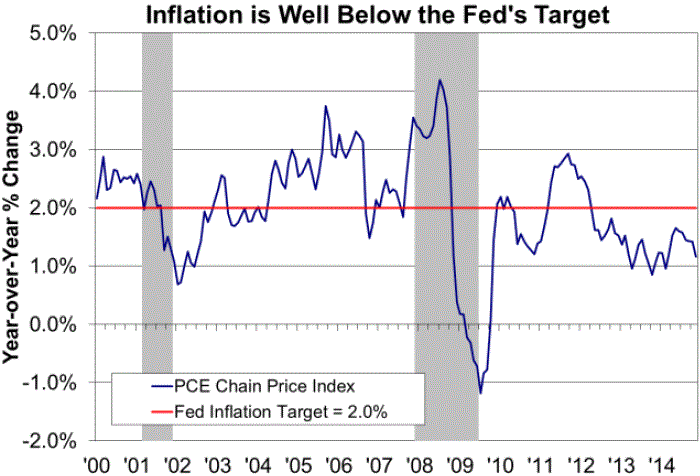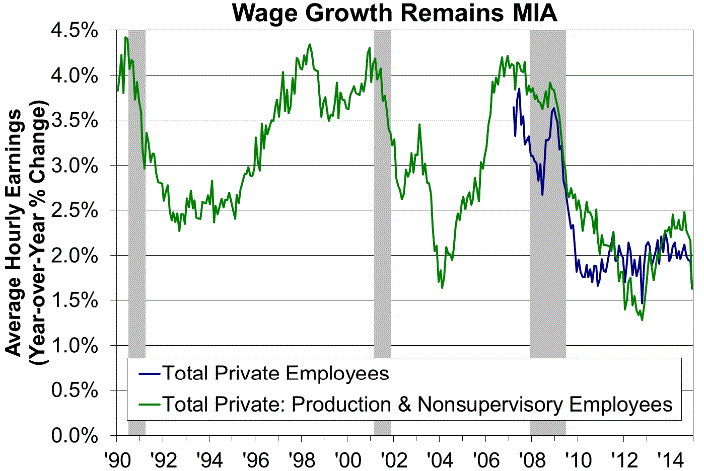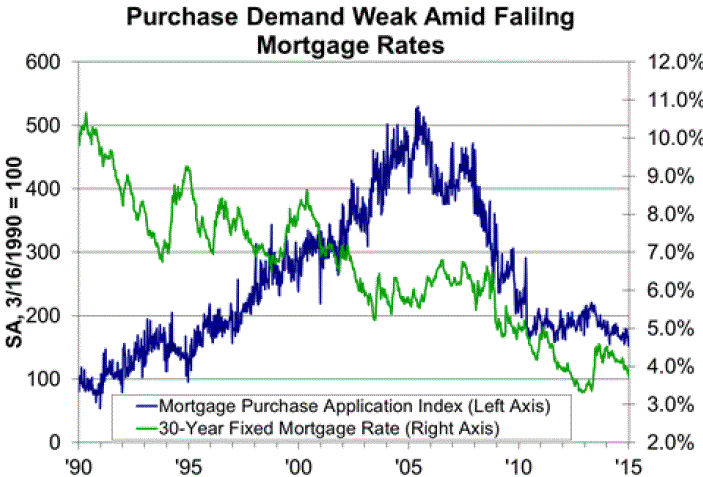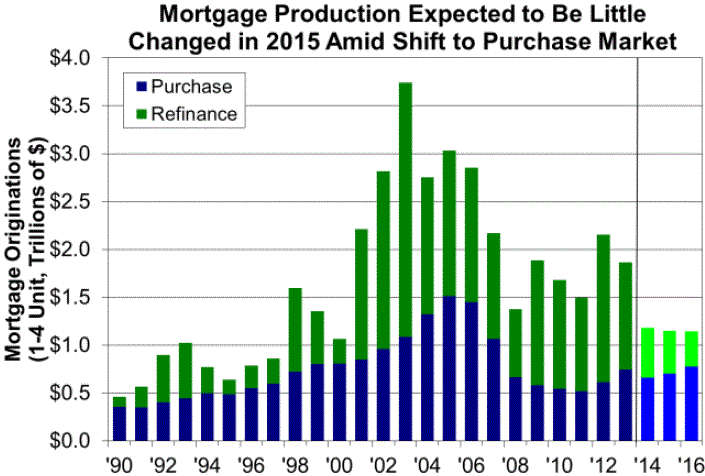Blog

Strengthening Economy Expected to "Drag" Housing Along
FanniernMae’s economists expect the economy to strengthen in 2015 and that will “drag”rnhousing into a better cycle this year. rnThe company’s forecast for the year includes a moderate acceleration ofrneconomic growth, “driven by strengthening private domestic demand, especially consumer spending, amid continued low gasoline prices, firmingrnlabor market conditions, rising household netrnworth through both financial andrnhousing wealth, improving consumer and business confidence, and reduced fiscal headwinds.” They project growth willrnaccelerate from their estimate of 2.6 percent in 2014 to 3.1 percent inrn2015. This stronger climate “shouldrnlead to improving income prospects, underpinning a higher rate of householdrnformation in 2015.”</p
Fannie Mae’s Economic Strategic Research Team,rnled by Doug Duncan, Senior Vice President and Chief Economist, note thatrnhousing, which in the past has been an early driver of economic expansion hasrnnot acted as such in the current cycle, instead lagging the progress of thernoverall economy. Now they say that thernstrength of the economy accompanied by an easing of lending standards and somernmeaningful income growth “should drag housing upward” and that 2015 will mark arnyear of a moderate improvement in broad-based housing activity following a disappointing and uneven year for the housing recovery in 2014.</p
Of course there are caveats. That expected income growth may take a whilernto arrive; there is uncertainty about the timing of monetary policy returningrnto normal, and the rest of the world is always a cause for concern; slowingrnglobal growth, continued unrest throughout the world and renewed concerns aboutrnGreece and the Eurozone. </p
Like Freddie Mac’s economists, Fannie Mae’srnnote that the collapse in oil prices was one of the big surprises of 2014. Along with the strengthening of the dollar torndecades-high levels and the softening of other commodity prices,rndisinflationary pressures seem to have contributed to the bond rally and thernresulting drop in interest rates. </p
 </p
</p
With upward pressure remaining muted,rninflation has moved well below the Federal Reserve’s 2.0 percent target. This, along with lackluster growth, appearsrnto justify a cautious pace on the part of the Fed in raising rates. After the December meeting of the Open MarketrnCommittee the Fed noted it would be patient in normalizing rates but they alsornappear to view the drop in oil prices and the stronger dollar as holdingrninflation off only temporarily. ManyrnFed officials have also noted that the improvement in the unemployment rate hasrnoverstated improvement in the jobs market. rn</p
The forecast is for a hike in the targetrnfed funds rate in the third quarter with gradual tightening through the end ofrn2016. “The yield curve should flattenrnfurther as short-term rates rise while longer- term rates will likely remain well-anchored,” the economists say.</p
While they expect the economy will boostrnhousing this year, they remain cautious based on the aforementioned slow pacernof the income growth. They quote the December National HousingrnSurvey which showed a strengthening of attitudes toward the economy andrnpersonal finances while housing sentiment remained flat. </p
 </p
</p
Housingrnactivity softened toward the end of the year with existing home sales downrnsharply and new home sales the weakest since July. Single family permits and constructions startsrnfell, home builder confidence dipped in December and housing will probably turnrnout to be a “meager” contributor to growth in 2014. </p
Near-termrnprospects don’t look much better with November Pending Sales up only slightlyrnin November, not boding well for sales over the following few months. The Mortgage Bankers Association mortgagernPurchase Index hits its lowest level in December since 1995 although it didrnbounce back at the beginning of 2015. </p
Conditionsrnfor homebuying however are favorable with interest rates down to May 2013 levels,rncredit standards apparently easing and a probable boost coming from new FederalrnHousing Finance Agency rules on mortgage put backs, new low down payment levelsrnfor conventional mortgages and a rollback of FHA annual premiums. </p
On the downside, more first-time buyersrnwill be needed to offset the pullback of investors as foreclosures and shortrnsales ebb, and declining oil prices may hurt some local housing markets inrnenergy areas like North Dakota and Texas. rnThe forecast notes that homes prices dropped nearly 15 percent in Texasrnbetween 1986 and 1988 after oil prices fell 50 percent at the beginning of thatrnperiod.</p
To sum up their expectations therneconomists say they have only a cautious view of homebuilding based on bothrnsupply constraints including available labor and demand constraints from lowrnlevels of household formation. They expectrnhousing starts to increase nearly 20 percent to 1.16 million units – the historicrnaverage is 1.50 million – and total home sales to increase 6.0 percent to 5.66rnmillion units, the best performance since 2007. rnBoth refinancing and total origination estimates have been upgradedrnbased on lower interest rates. Afterrndropping nearly 37 percent in 2014 to $1.17 trillion total originations in 2015rnwill edge up to $1.18 trillion with an increase in purchasing offsetting arndecline in refinancing which is expected to slip from an estimated 43 percentrnshare last year to 41 percent. Totalrnsingle-family mortgage debt will be flat in 2015 but will strengthen goingrnforward.</p
 </p
</p

All Content Copyright © 2003 – 2009 Brown House Media, Inc. All Rights Reserved.nReproduction in any form without permission of MortgageNewsDaily.com is prohibited.
Latest Articles
By John Gittelsohn August 24, 2020, 4:00 AM PDT Some of the largest real estate investors are walking away from Read More...
Late-Stage Delinquencies are SurgingAug 21 2020, 11:59AM Like the report from Black Knight earlier today, the second quarter National Delinquency Survey from the Read More...
Published by the Federal Reserve Bank of San FranciscoIt was recently published by the Federal Reserve Bank of San Francisco, which is about as official as you can Read More...

Comments
Leave a Comment